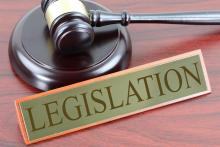
Fast, affordable Internet access for all.

Snapshot
This week’s community broadband state legislative roundup revisits and provides updates on important bills moving through the state legislatures in Washington, Oklahoma, and California.
The State Scene
Washington
We’ve been closely covering S.B. 5383 and H.B. 1336, two bills in Washington state that would give Public Utilities Districts (PUDs) and port districts the authority to offer retail telecommunications services.
Our initial coverage pointed out shortcomings in S.B. 5383. The bill originally contained a preemption clause that gave private Internet Service Providers (ISPs) the power to reject PUDs’ and ports’ project proposals in areas where incumbent ISPs claim they plan to expand service within six months.
Since our last reporting on this piece of legislation, the bill was amended by the State House Community and Economic Development Committee, removing the veto authority initially given to existing ISPs. However, a new provision favoring incumbent cable ISPs was also added, which would prohibit a PUD or port from providing retail Internet services in an area where an existing provider offers service at a minimum of 100 Megabits per second (Mbps) download speed and 20 Mbps upload speed. The minimum speed requirements of this provision would be increased to stay consistent with Washington’s state definition of broadband.
The Committee also amended the bill to allow PUDs and ports to provide retail services in served areas, but only when building to reach an unserved region.
H.B. 1336, which aims to allow PUDs, ports, cities, towns, and counties to provide Internet access services on a retail basis, was amended by Washington’s Senate Environment, Energy and Technology Committee on March 25 to increase the requirements that must be met by counties, cities, and towns before they can receive financial assistance for capital projects, under Washington’s Growth Management Act. Under the amended version of H.B. 1336, a municipality would not be able to receive financial assistance for a project unless it has adopted a comprehensive plan, which includes a capital facilities element and development regulations.
Oklahoma
Seven broadband bills that passed Oklahoma’s House of Representatives in March are now moving through the State Senate, one of which is aiming to double-check the accuracy of FCC mapping.
H.B. 2928 would require private broadband service providers operating in the state, including satellite-based providers, to annually submit the same mapping data to the Oklahoma Department of Commerce and Rural Broadband Expansion Council that providers are required to submit to the FCC under the Broadband Deployment Accuracy and Technological Availability (DATA) Act.
The bill proposes that “after the FCC completes the national Broadband Serviceable Location Fabric and accompanying National Broadband Availability Map, the Rural Broadband Expansion Council shall annually evaluate whether the State of Oklahoma needs to continue producing an annually updated statewide broadband map.”
Though the bill attempts to check the accuracy of federal mapping, ISPs would be allowed to report advertised download and upload speeds, rather than the actual varied speeds end-users experience. The mapping data disclosed by Oklahoma’s service providers would remain confidential and anonymous.
H.B. 2928 passed Oklahoma’s Senate Committee on Business, Commerce and Tourism, by a vote of 12-1 on March 30.
Kentucky
On March 30, the last day of Kentucky’s legislative session, the state’s Republican-dominanated legislature convened in an attempt to override 27 bills vetoed by Democratic Kentucky Gov. Andy Beshear. The voting lasted late into the night with Kentucky legislators overturning 24 of the 27 vetoes, including one against H.B. 320, a bill aiming to expand Internet access by allowing electric cooperatives to qualify for financial assistance to deliver broadband service to rural regions of the state.
The bill has been submitted to the Kentucky Secretary of State without the Governor’s signature to make it law. Although Gov. Beshear supports the bill, he objected to a provision that limits the amount of funding able to be distributed to electric co-ops within the next year to only $50 million. That would put Kentucky “at a competitive disadvantage to other states at a time all will be competing to purchase and run fiber," he told The Courier-Journal.
Still, the measure will more than double the amount of money available through Kentucky’s Broadband Development Fund to $250,000. Under H.B. 320, electric utilities can pledge up to 25 percent of their net assets as collateral for loans to expand Internet infrastructure to unserved or underserved households.
California
Three bills that would expand Internet access across California are set to be heard in the General Assembly’s Communications and Conveyance Committee on April 14.
A.B. 34 would allow California voters to create a broadband subsidy program via a referendum.
A.B. 14 would require California’s Public Utilities Commission to annually conduct a financial and performance audit of the California Advanced Services Fund (CASF) to determine the effectiveness of the program.
A.B. 1176 would establish the California Connect Fund in the State Treasury to ensure high-speed Internet service is available to every household at affordable rates.
Another bill in the state Senate is set to be heard on April 12 in the Energy, Utilities and Communications Committee. S.B. 4 would enable local governments to finance broadband projects with bonds. If it passes, local governments would have access to more than $1 billion in long-term, low interest financing for infrastructure projects.
National News
U.S. Reps. Jamaal Bowman (D-NY) and Emanuel Cleaver, II (D-MO) introduced the Broadband Justice Act on March 16 which would provide $5 billion to expand affordable, high-speed Internet access to individuals living in federally subsidized housing.
The bill would require the Housing and Urban Development Department, the U.S. Treasury and the USDA to define broadband as a utility, so Internet access services can be subsidized similarly to the way gas and electricity already are. The bill would also create a new grant program to help deploy strand broadband wiring within housing units, build out Internet access infrastructure, and expand digital literacy initiatives.
